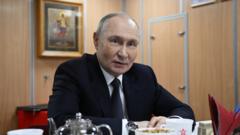European leaders face challenges in uniting with the U.S. over support for Ukraine, as differing priorities emerge under the Trump administration’s strategy, prompting fears of a fragmented alliance.**
Europe and the U.S. Diverge Over Ukraine’s Future Amid Trump's Policies**

Europe and the U.S. Diverge Over Ukraine’s Future Amid Trump's Policies**
Ongoing diplomatic tensions reveal discrepancies in the approach to the Ukraine war as allies struggle to find common ground.**
European leaders convened in Paris recently for discussions aimed at creating a coalition to bolster Ukraine amidst its ongoing conflict with Russia. However, the summit ended with limited understanding of the group's collective strategies. Central to these deliberations was the urgent need for a cohesive response among allies to fortify Ukraine's stance against further aggression.
French President Emmanuel Macron emphasized the necessity of establishing a stable and democratic Ukraine that can confidently navigate peace negotiations. Contrarily, the Trump administration is focused on ending the protracted conflict swiftly and on terms advantageous primarily for the United States. This shift includes reestablishing a rapport with Russia and seeking reparations from Ukraine, which some view as an inadequate acknowledgment of the U.S.'s assistance.
As a result, a disconcerting schism has emerged among what were once united allies. European leaders fear that Trump's approach risks inadvertently rewarding aggression and undermining the principles they stand for. With the starkly contrasting views on how best to support Ukraine, the alliance's future hangs in the balance, potentially marking a profound turn in transatlantic relations.




















